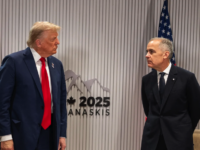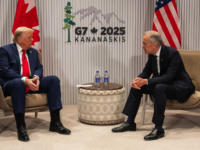The Toronto International Film Festival has removed from its 2025 schedule a documentary film by Canadian filmmaker Barry Avrich that tells the story of Noam Tibon’s mission to save his family during the October 7th attacks by Hamas in Israel. The film is based on the excellent book by Amir Timon, the Gates of Gaza, which recounts both the rescue effort and the longstanding fraught relationship between Israel and Gaza. According to Deadline, the film, titled The Road Between Us: The Ultimate Rescue, was scheduled to be included in the program announced last week. But TIFF asked that the source of Hamas body-cam footage included in the film be identified and to provide copyright clearances for the video. You read that correctly: TIFF wanted the filmmakers to obtain copyright licences from Hamas terrorists.
News
Carney’s Digital Recalibration: How the Government is Trending Away from Justin Trudeau’s Digital Policy
Digital policies did not play a prominent role in the last election given the intense focus on the Canada-U.S. relationship. Prime Minister Mark Carney started as a bit of a blank slate on the issue, but over the past few months a trend has emerged as he distances himself from the Justin Trudeau approach with important shifts on telecom, taxation, and the regulation of artificial intelligence. Further, recent hints of an openness to re-considering the Online News Act and heightened pressure from the U.S. on the Online Streaming Act suggests that a full overhaul may be a possibility.
Another Canadian Digital Policy Own Goal: Corporate TikTok Ban Leads to Millions in Lost Cultural Group Support
The government’s bad run of digital policy choices that led to blocked news links on Facebook and Instagram, ongoing litigation over mandated streaming payments, and the recent cancellation of the digital services tax, has paved the way for another costly loss. Last fall, the Canadian government announced the conclusion of its national security review of TikTok and arrived at a curious plan: ban the company from operating in Canada but leave the app itself untouched. The decision raised concerns about weakening privacy enforcement as the Privacy Commissioner of Canada acknowledged that it is easier to compel documents and support investigations if the company is in Canada (the results of a Privacy Commissioner investigation into TikTok have still not been released).
Canadian Government Caves on Digital Services Tax After Years of Dismissing the Risks of Trade Retaliation
After years of dismissing the warnings of likely retaliation, the Canadian government caved last night on the digital services tax. Faced with the prospect of the U.S. suspending trade negotiations, Finance Minister François-Philippe Champagne announced that the government would drop the DST altogether, payments scheduled for Monday would be cancelled, and legislation will be forthcoming to rescind the legislation that created it in the first place. Over the weekend, I wrote about the repeated warnings that the DST was a serious trade irritant with the U.S. that cut across party and presidential lines. While ignoring the risks was bad enough, I argued that Canada played its DST card too early. Rather than delaying implementation in the hopes of incorporating it into a broader trade deal with U.S., it marched ahead, leading to an entirely predictable response from U.S. President Donald Trump. That left Canada in a no-win situation: stick with the DST but face the prospect of higher tariffs or embarrassingly drop the DST (and $7.2 billion in revenue over five years) with only restarting negotiations that were on until government overplayed its hand to show for it.
Ignoring the Warning Signs: Why Did the Canadian Government Dismiss the Trade Risks of a Digital Services Tax?
U.S. President Donald Trump announced yesterday that he was suspending trade negotiations with Canada due to the imminent implementation of the digital services tax (DST). The result could be increased tariffs on Canadian products and a stalemate on many of the current trade battles between the two countries. This result should not come as a surprise. Indeed, the prospect of a trade war over the DST has been readily apparent for years. In my Law Bytes podcast episode in May on Canadian digital policy under Prime Minister Mark Carney, it was the top short term issue (I did not anticipate burying lawful access in a border bill).
Just prior to Trump’s inauguration in January, I wrote:











